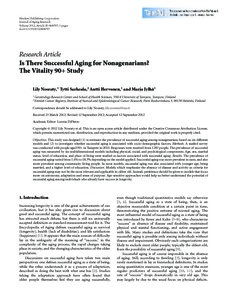Is There Successful Aging for Nonagenarians? The Vitality 90+ Study
Nosraty, Lily; Sarkeala, Tytti; Hervonen, Antti; Jylhä, Marja (2012)
Nosraty, Lily
Sarkeala, Tytti
Hervonen, Antti
Jylhä, Marja
2012
Journal of Aging Research 2012
ID 868797
Terveystieteiden yksikkö - School of Health Sciences
Julkaisun pysyvä osoite on
https://urn.fi/URN:NBN:fi:uta-201606031780
https://urn.fi/URN:NBN:fi:uta-201606031780
Kuvaus
Hindawi
Tiivistelmä
Objectives. This study was designed (1) to estimate the prevalence of successful aging among nonagenarians based on six different models and (2) to investigate whether successful aging is associated with socio-demographic factors. Methods. A mailed survey was conducted with people aged 90+ in Tampere in 2010. Responses were received from 1283 people. The prevalence of successful aging was measured by six multidimensional models including physical, social, and psychological components. Age, sex, marital status, level of education, and place of living were studied as factors associated with successful aging. Results. The prevalence of successful aging varied from 1.6% to 18.3% depending on the model applied. Successful aging was more prevalent in men, and also more prevalent among community-living people. In most models, successful aging was also associated with younger age, being married, and a higher level of education. Discussion. Models which emphasize the absence of disease and activity as criteria for successful aging may not be the most relevant and applicable in oldest old. Instead, preference should be given to models that focus more on autonomy, adaptation and sense of purpose. Age-sensitive approaches would help us better understand the potential of successful aging among individuals who already have success in longevity.
Kokoelmat
- Artikkelit [6140]
